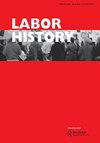尼日利亚的劳工骚动、报纸和激进民族主义:对埃努古煤矿枪击事件的分析
IF 0.7
4区 管理学
Q1 HISTORY
引用次数: 0
摘要
在对非洲非殖民化进程和民族主义争取政治独立斗争的分析中,劳工运动和争取人权的新闻行动是共同的特征。但大多数研究将非殖民化时期的劳工危机和新闻行动主义仅仅视为独立运动线性叙事的子集。根据埃努古煤矿枪击事件的经验数据,本文将劳工运动作为一个独立的事件进行考察,并回顾了与民族主义斗争重叠的领域。它超越了主流的民族主义观点,重新审视了煤矿枪击事件,这种观点将非殖民化时期的每一次社会、经济和政治抗议都归结为民族主义运动的单一元叙事。最后,对尼日利亚报纸在工会与殖民政府、民族主义者与殖民政府之间的危机中所扮演的调解人角色进行了评价。本文认为,尽管当时的劳工骚动与民族主义运动相互联系,但前者既具有独立的特点,又与后者巧合。同样,并非所有报纸的人权鼓动都以独立为中心。最后,民族主义者通过网络进程,通过扩大和塑造当地的抗议活动作为独立运动,从劳工骚动和新闻激进主义中受益。关键词:煤矿枪击案;劳工煽动;新闻煽动;激进民族主义感谢本文的编辑和两位匿名审稿人。我还要感谢Saheed Aderinto教授和Rouven Kuntsmann博士为本文收集档案文件提供的帮助。披露声明作者未报告潜在的利益冲突。shina Alimi目前是尼日利亚伊莱伊夫奥巴费米·阿沃洛沃大学历史系的高级讲师。他的研究重点是非洲的社会和政治史。他是拉各斯大学非洲和散居侨民研究所2022年拉各斯非洲集群中心博士后奖学金获得者。他是苏格兰爱丁堡大学非洲研究中心的非住宅催化剂研究员。他正在进行的研究项目位于非洲死亡、空间和物质文化的交叉点。他最近的一篇文章题为“双城故事”:拉各斯市的墓地异托邦和空间关系,OMEGA-Journal of Death and Dying, 2022 journals.sagepub.com/home/ome本文章由计算机程序翻译,如有差异,请以英文原文为准。
Labour agitation, newspaper press and radical nationalism in Nigeria: analysis of the Enugu Colliery Shootings
ABSTRACTIn the analysis of decolonization process and nationalist struggles for political independence of Africa, labour agitations and the press activism for human rights are common features. But most studies have treated labour crisis and the press activism during the period of decolonization as mere subsets of the linear narrative of independence movement. Drawing on the empirical data of the Enugu Colliery Shootings incident, this paper examined labour agitation as an independent event and reviewed the area of overlap with the nationalist struggles. It re-examined the Colliery Shootings beyond the preponderant nationalist view that lumped every social, economic and political protest of the decolonization period as a single metanarrative of nationalist movements. Lastly, the roles of Nigerian newspapers as mediators in the crises between the labour unions and the colonial government, and the nationalists with the colonial government were appraised. The paper argued that, despite the interconnection of labour agitations with nationalist movements of the period, the former was both characteristically independent and coincidental with the latter. Similarly, not all human rights agitations by the newspapers were independence-focused. Finally, the nationalists, through networking process, benefited from labour agitations and press activism by expanding and molding local protests as independence movements.KEYWORDS: Colliery Shootingslabour agitationpress agitationradical nationalism AcknowledgmentsI thank the editor and the two anonymous reviewers of this paper. I also thank Prof. Saheed Aderinto and Dr Rouven Kuntsmann for their assistance in the collection of archival documents for this paper.Disclosure statementNo potential conflict of interest was reported by the author(s).Additional informationNotes on contributorsShina AlimiShina Alimi is currently a Senior Lecturer at the Department of History, Obafemi Awolowo University, Ile-Ife, Nigeria. His research focuses on social and political history of Africa. He was a recipient of the 2022 Lagos African Cluster Centre postdoctoral Fellowship at the Institute of African and Diaspora Studies, University of Lagos. He is a non-residential Catalyst Fellow of the Centre of African Studies, University of Edinburgh, Scotland. His on-going research project sits at the intersection of death, space and material culture in Africa. His most recent article is titled “A Tale of Two Cities”: Cemetery Heterotopia and Spatial Relations in Lagos City, OMEGA-Journal of Death and Dying, 2022 journals.sagepub.com/home/ome
求助全文
通过发布文献求助,成功后即可免费获取论文全文。
去求助
来源期刊

Labor History
Multiple-
CiteScore
1.00
自引率
28.60%
发文量
44
期刊介绍:
Labor History is the pre-eminent journal for historical scholarship on labor. It is thoroughly ecumenical in its approach and showcases the work of labor historians, industrial relations scholars, labor economists, political scientists, sociologists, social movement theorists, business scholars and all others who write about labor issues. Labor History is also committed to geographical and chronological breadth. It publishes work on labor in the US and all other areas of the world. It is concerned with questions of labor in every time period, from the eighteenth century to contemporary events. Labor History provides a forum for all labor scholars, thus helping to bind together a large but fragmented area of study. By embracing all disciplines, time frames and locales, Labor History is the flagship journal of the entire field. All research articles published in the journal have undergone rigorous peer review, based on initial editor screening and refereeing by at least two anonymous referees.
 求助内容:
求助内容: 应助结果提醒方式:
应助结果提醒方式:


